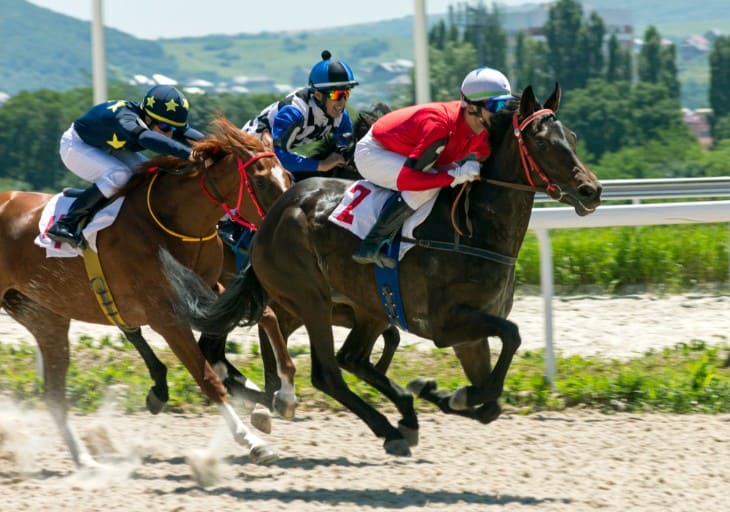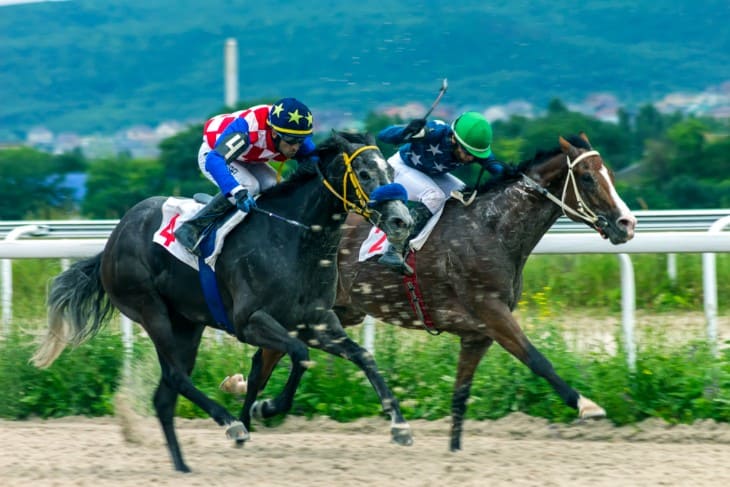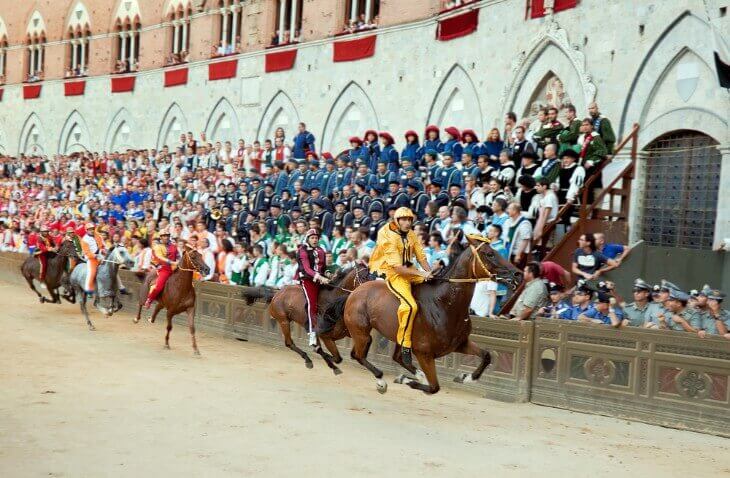Horse racing, deeply rooted in the United Kingdom's history, is more than just a sport; it is a cherished cultural phenomenon. Generations have been captivated by the thunderous hooves pounding the turf, the elegance of the jockeys, and the thrill of watching noble steeds compete for victory. In this article, we embark on a journey to explore the traditions, festivals, and ceremonies that celebrate horse racing in the UK and uncover the profound cultural significance it holds.
A Pioneering Pursuit - The Rich Heritage of Horse Racing in the UK
The tale of horse racing in the UK dates back centuries, interwoven with the country's history and royalty. Originating in the early 12th century, horse racing quickly gained popularity among British nobility, becoming a pastime for kings and queens. Over time, it expanded to embrace all walks of life, becoming a sport accessible to the commoners.
This rich heritage finds its roots in the breathtaking landscapes of the English countryside, where rolling hills and expansive plains have long provided the perfect stage for horse racing events. From the rural charm of Newmarket to the picturesque elegance of York, each region has its unique racing traditions and stories that have been passed down through the generations.
Even as the sport evolved, certain traditions remained unaltered. The thunderous roar of the crowd, the ceremonial parade of jockeys, and the rhythmic sound of hooves on the turf evoke a sense of nostalgia, reminding spectators of a bygone era.
The Ascot Spectacle - Unraveling the Timeless Royal Tradition
No celebration of horse racing in the UK would be complete without a mention of the prestigious Ascot Racecourse. Established in 1711 by Queen Anne, this legendary venue has become synonymous with elegance, royalty, and timeless traditions.
The Royal Ascot, an annual highlight of the British social calendar, attracts spectators from all corners of the globe. The event's dress code, epitomized by extravagant hats and stunning outfits, is a nod to its refined heritage. Attendees grace the occasion with utmost sophistication, and even the Royal Family takes part, enhancing the racecourse's regal allure.
Beyond the fashion and glamour, the Royal Ascot showcases some of the finest horse racing in the world. The prestigious Gold Cup, first contested in 1807, is the event's most esteemed race, drawing top-class horses and top-tier jockeys from far and wide.
The Ascot Racecourse's ambience is steeped in history, and every corner tells a story of its own. From the architecture of the grandstand to the whispers of historic victories, the palpable sense of tradition is unmistakable.
Uniting the Nation - The Grand National and its Enduring Legacy
The Grand National, a quintessential part of the British horse racing calendar, is a race that transcends all boundaries. Held annually at Aintree Racecourse near Liverpool, the event unites the nation in a shared sense of excitement and anticipation. Dating back to 1839, the Grand National has become a symbol of resilience, tradition, and sporting excellence.
Known for its challenging obstacles, the Grand National is not for the faint-hearted. The grueling course, featuring 30 daunting fences, tests both horse and rider to their limits. Each jump comes with its own history, adding to the mystique and allure of the event. The most famous of all is Becher's Brook, named after Captain Martin Becher, who took a tumble there in the inaugural race.
Beyond the racing, the Grand National boasts an unparalleled sense of camaraderie. Millions of people across the country tune in to watch the event, cheering for their favorite horses and hoping to witness history being made. It's an occasion when workplaces pause, and families gather around their televisions, forming a collective bond that spans generations.
The Grand National's enduring legacy is not only in its thrilling racing moments but also in the tales of legendary horses like Red Rum, who won the race three times in the 1970s, capturing the hearts of the nation. These stories have become folklore, passed down from parents to children, adding to the event's deep-rooted cultural significance.
Cheltenham Festival - Where Prestige and Passion Collide
Nestled amidst the picturesque Cotswold Hills, the Cheltenham Festival is a celebration of steeplechase excellence and unwavering passion for the sport. Held annually at Cheltenham Racecourse in Gloucestershire, the event lures fans and aficionados from all corners of the UK and beyond.
The festival's crown jewel, the Cheltenham Gold Cup, is one of the most coveted prizes in horse racing. It is the ultimate test of stamina, speed, and jumping prowess. Horses and jockeys are put through their paces, navigating a demanding course that requires skill and bravery to conquer.
But the Cheltenham Festival is more than just about racing; it's an experience that goes beyond the tracks. It's a vibrant carnival where people revel in the camaraderie of fellow enthusiasts, relishing in the electric atmosphere. The streets are alive with the sound of laughter and cheers, and the pubs are filled with animated discussions about the day's races.
Cheltenham is a festival of fervor, where the highs and lows of racing unfold dramatically. The "Cheltenham Roar" that erupts from the crowd as the first race begins is an iconic moment, sending shivers down the spine of both spectators and participants. As each race unfolds, the tension builds, and the crowd is held in rapt attention, as though witnessing a theatrical masterpiece.
Glitz and Glamour - Exploring the Social Pageantry of Epsom Derby
The Epsom Derby, an iconic flat racing event held at the Epsom Downs Racecourse, is a spectacle that seamlessly combines sporting prowess with high society. Established in 1780, it is the world's premier horse race for three-year-old thoroughbreds and continues to be a highlight of the British social calendar.
As the sun glistens over the verdant English countryside, elegantly dressed ladies and gentlemen descend upon the racecourse, adorned in their finest attire. The women don hats and dresses, showcasing their unique style and creativity, while the men don dapper suits and ties. The fashion at Epsom Derby is not just a display of individual taste; it's a time-honored tradition that pays homage to the race's storied past.
The atmosphere is electric, and excitement fills the air as spectators take their places to witness the racing spectacle. The Epsom Derby is not just a race; it's a cultural event that blends pageantry with athleticism. The moment the horses charge out of the starting gate, the sense of anticipation is palpable. The roaring crowd adds to the drama, making every stride towards the finish line a moment of intensity.

A Tale of Triumph - The Scottish Grand National and its Regional Significance
While horse racing is celebrated across the UK, the Scottish Grand National holds a special place in the hearts of the Scottish people. This prestigious event, hosted at Ayr Racecourse, is not only a display of equestrian prowess but also a reflection of Scotland's vibrant culture and traditions.
As bagpipes fill the air with their distinctive melody, the atmosphere at the Scottish Grand National becomes distinctly Scottish. The event showcases the nation's hospitality and warmth as spectators gather to enjoy the racing action amidst the stunning Scottish landscape.
The Scottish Grand National is a day of unity and pride, where the entire nation comes together to revel in the excitement of the sport. It's a time when national identity is celebrated, and the racecourse buzzes with passion and camaraderie.
This event is not just about the sport; it's about the Scottish spirit of perseverance and determination, qualities that resonate with the race's demanding course. The race's rich history and regional significance add to its allure, drawing racing enthusiasts and locals alike.
Galloping Through History - Retracing Historic Racing Venues Across the UK
As we journey through the traditions and festivals celebrating horse racing in the UK, it's impossible to ignore the historical racing venues that have witnessed countless epic moments over the centuries. These venues are not just arenas for sporting events; they are living monuments to the sport's storied past.
Newmarket, known as the "Home of Horse Racing," holds a special place in the hearts of racing enthusiasts. Dating back to the 17th century, this ancient town has been a hub for equestrian activity, with its two racecourses - the Rowley Mile and the July Course - hosting some of the most prestigious races in the country.
A visit to York Racecourse takes you back in time to the Roman era, where the ancient city walls provide a unique backdrop for the races. With a history spanning over 2,000 years, York is an enchanting blend of tradition and modernity, where racing excellence meets historical charm.
Venturing north, we find Musselburgh Racecourse in Scotland, boasting a history dating back to 1816. As one of the oldest racecourses in the country, it has been witness to numerous thrilling races, woven into the fabric of Scotland's racing heritage.
From Epsom Downs to Aintree and beyond, these historical venues have become an integral part of the UK's cultural tapestry. As spectators gather to watch the thunderous races, they are not just witnessing sporting events; they are engaging with living history, connecting with the generations of racing enthusiasts who came before them.
Feted in Furlongs - Honoring Legendary Horses and Jockeys
The world of horse racing is adorned with tales of exceptional horses and skilled jockeys whose names are etched in racing folklore. These champions not only dominated the racetracks but also captured the hearts of the nation, leaving a lasting legacy that transcends time.
Red Rum, the legendary three-time winner of the Grand National in the 1970s, remains one of the sport's most celebrated icons. His remarkable feats and indomitable spirit earned him the admiration of millions, becoming a symbol of courage and tenacity.
In more recent times, the mighty Frankel mesmerized racing enthusiasts with his unbeaten record and breathtaking performances. Trained by the legendary Sir Henry Cecil, Frankel's elegance and power were a sight to behold, captivating fans around the world.
Alongside these equine superstars, skilled jockeys have left their mark on the sport. Lester Piggott, often hailed as one of the greatest jockeys in history, rode to victory in countless races, showcasing his mastery in the saddle and his innate understanding of horses.
Honoring these legends, racing festivals often include tributes and ceremonies that celebrate the contributions of both equine and human athletes. From the statues that stand tall at racecourses to the stories recounted in racing museums, these icons are remembered with reverence and awe.
Betting on Tradition - The Cultural Impact of Wagering on Horse Racing

Horse racing and betting have been inseparable companions for centuries. From the earliest days of the sport, spectators have wagered on the outcome of races, adding an element of excitement and anticipation to the events. Today, betting remains an integral part of horse racing culture in the UK.
The distinctive cries of bookmakers at the racecourse, the rustle of betting slips, and the buzz of anticipation as the horses approach the starting line all form part of the unique ambiance of a racing event. Whether it's a flutter on the favourite or a strategic punt on an outsider, betting on horse races adds an extra layer of engagement for spectators.
For many, horse racing betting is a social activity, where friends and families gather to discuss their selections and compare strategies. The banter and camaraderie are as much a part of the experience as the races themselves. Betting on the horses is an opportunity to share knowledge and insights, creating a sense of community among punters.
The cultural significance of horse racing betting extends beyond the racecourse. Betting shops, a familiar sight on British high streets, have become integral to the fabric of local communities. These establishments offer a place for punters to gather, share their passion for racing, and place their bets in a lively atmosphere.
However, responsible gambling is also a key focus in the UK, and the sport seeks to strike a balance between enjoyment and safeguarding the well-being of individuals. Betting responsibly, knowing one's limits, and seeking help if needed are all important aspects of the culture surrounding horse racing betting.
Beyond the Finish Line - Preserving and Promoting Equestrian Heritage for Future Generations
As we celebrate the traditions, festivals, and ceremonies of horse racing in the UK, it is vital to consider the importance of preserving this equestrian heritage for future generations. The sport's rich history and cultural significance make it an integral part of British identity.
Efforts to preserve and promote equestrian heritage are undertaken through various means. Racing museums and exhibitions offer a glimpse into the past, showcasing the evolution of the sport and celebrating the contributions of legendary horses and jockeys.
Education plays a crucial role in passing down the knowledge and passion for horse racing to younger generations. Schools and organizations collaborate to introduce young people to the sport, offering opportunities to learn about horsemanship, racing, and the industry's various aspects.
Additionally, initiatives like Riding for the Disabled Association (RDA) provide therapeutic horse riding programs for individuals with disabilities, highlighting the broader positive impact that the equestrian world can have on society.
Beyond the racing tracks, equestrian tourism offers the opportunity for visitors and locals alike to experience the charm of the British countryside and engage with horses in various ways. Riding trails, horse trekking, and equine-themed events draw people closer to these majestic animals and the equestrian heritage that surrounds them.
As we conclude our exploration of the cultural significance of horse racing in the UK, let us remember that it is not just about the thrill of racing or the pageantry of festivals. It is a timeless celebration of tradition, history, and passion—a celebration that continues to captivate hearts and minds and inspire generations to come.








